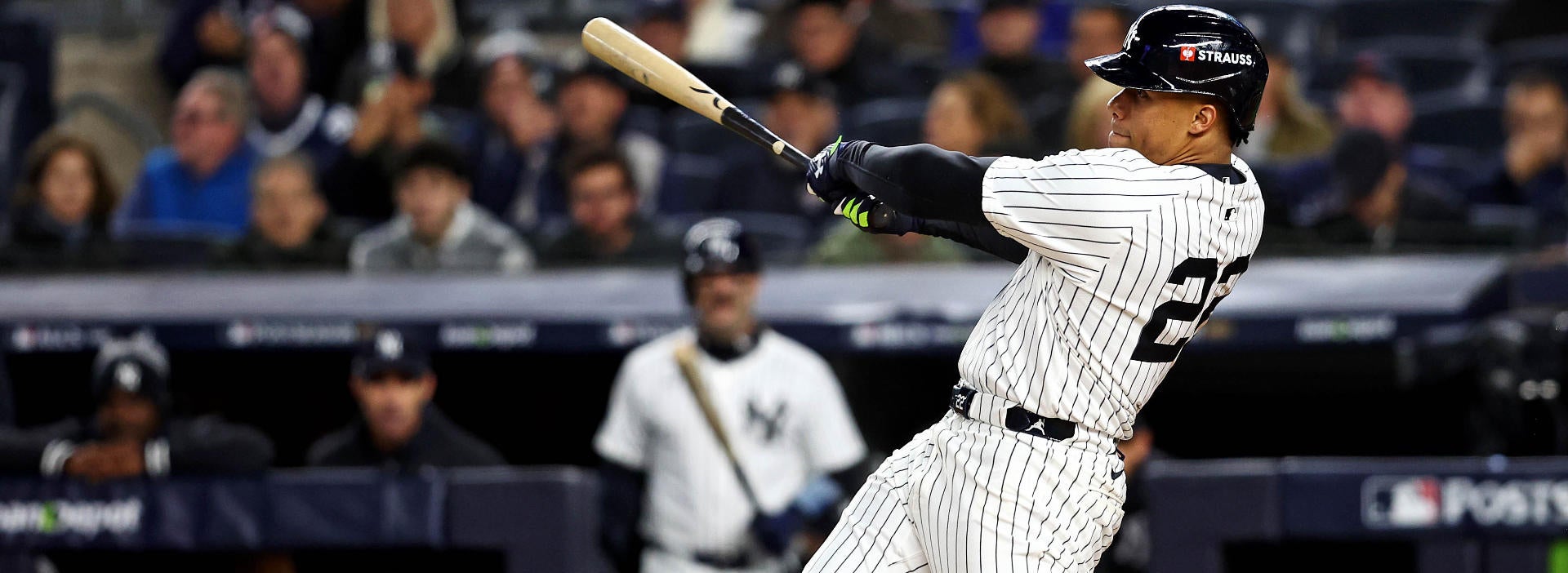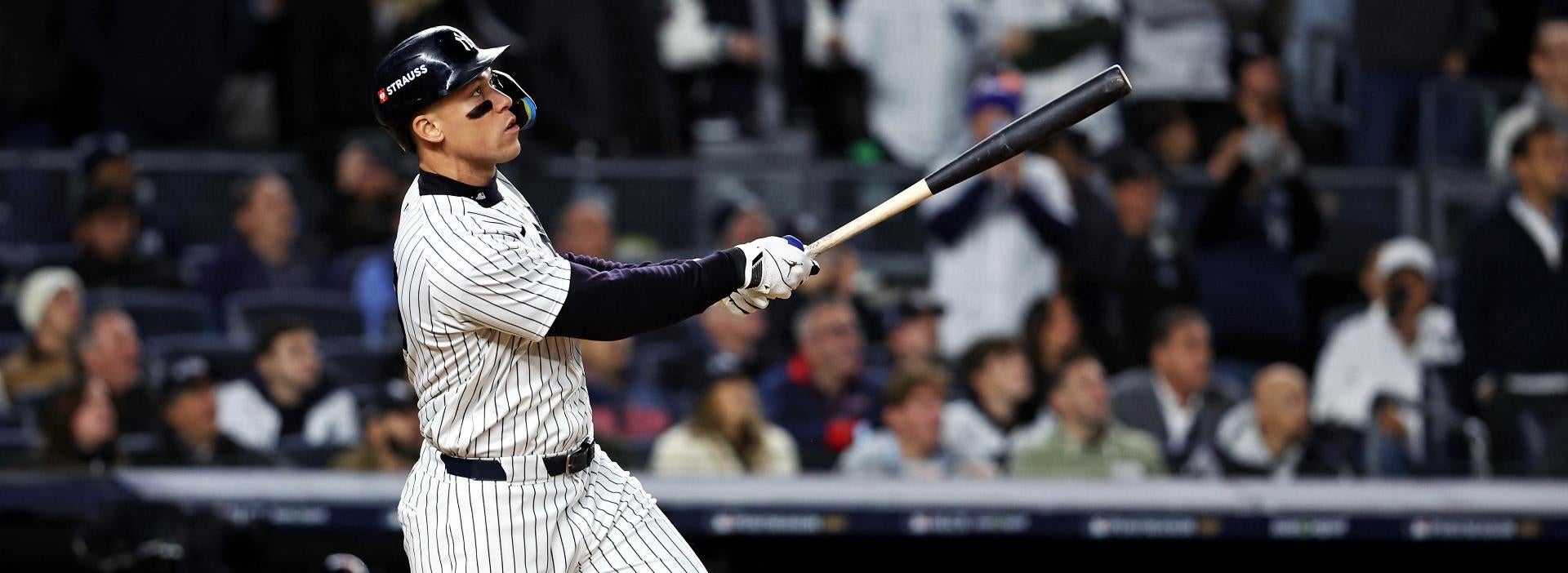Player News
Featured Stories
This league is not active at the moment.
Thanks for checking in! Our league's home is in the off-season right now. Come back when the season starts for all the latest picks and projections.
MLB betting is increasing in popularity and a one-stop shop for daily MLB odds is an invaluable tool for MLB bettors. With 30 teams playing 162 regular-season MLB games per season, there are more opportunities to bet on baseball than in any other major American sport.
However, if you haven't bookmarked an MLB odds page that shows you where to find the best MLB money line prices, MLB run lines and MLB over/under totals, you're putting yourself at a disadvantage. Here are the top MLB sports betting terms to know:
MLB Odds sports betting glossaryMoney line: A money-line bet is a wager on which team will win the game, with odds adjusted to reflect which team is favored. If Boston is a -145 favorite against Toronto, that means a $145 bet on Boston would win $100 if Boston is victorious. Meanwhile, Toronto might be listed as a +122 underdog, meaning a $100 wager would win $122.
Run line: The run line is baseball's version of the spread, with one team being spotted a certain number of runs to balance the odds of the game. So if Cleveland is the -1.5 favorite on the run line over Minnesota, Cleveland must win by two runs or more for the wager to cash. Pricing is also adapted to reflect the likelihood of the outcome.
Over/under: One of the simplest and most popular MLB betting options, this is simply a bet on how many runs will be scored in a given game. If the over/under for San Diego vs. Colorado is 9.5, over bets cash if the two teams combine to score 10 runs or more while under bets cash if they combine for nine runs or fewer.
Underdog: The underdog is the team deemed less likely to win the game based on the MLB odds. A bet on an underdog typically yields a larger return than a bet on the favorite.
Favorite: On the other hand, a favorite is the team that is deemed more likely to win the game. Bettors often pay a premium for betting on a favorite but they're also the team that more often wins the game outright.
Opening line: The opening line are the odds that were set whenever the selected betting market was opened. Those odds will change as wagers come in or as news that impacts the game, like starting lineups or MLB injuries, occurs.
Closing line: Conversely, the closing line are the odds that are active whenever a betting market officially closes. In Major League Baseball, that typically occurs at first pitch.
Consensus odds: These odds are generally defined as an average of all available betting markets. Different sportsbooks may price markets variably based on the action they've taken or their own interpretation of information.
Futures: While money line, run line and over/under bets are all single-game bets, futures markets encompass almost anything that falls outside of that spectrum. MLB futures include total regular-season wins, World Series odds, MVP odds and much more.
American odds: American odds are centered around either winning or wagering $100 for simplicity's sake. So if a team is listed as a -143 favorite, that means a $143 winning wager would net $100 in profit. If a team is listed as a +255 underdog, that means a $100 winning wager would net $255 in profit.
Fractional odds: Fractional odds, often used in futures markets where there are more than two teams in play, feature the odds listed as fractions. So if San Francisco is 20/1 to win the World Series, that means a successful $100 wager on San Francisco would net $2100 (the $100 principle plus $2000 in profit).
Juice: Also known as "The Vig" or vigorish, juice is effectively the tax that oddsmakers charge for handling a wager. If a book determines a game is a virtual coinflip, they may price both options at -110 to give themselves a 10% rake on all the action.
Push: A push is a bet where neither the bettor or the sportsbook wins. If an over/under for total runs is set at 9 and both teams combine to score exactly nine runs, the result is a push and the principle is returned to the bettor.
Handle: A handle is the total action taken by a sportsbook on any game, regardless of type of wager. It does not account for what the sportsbooks had to pay out and is not an accurate representation of revenues or profits.
Live/in-game betting: Many sportsbooks now offer live/in-game wagering that allows you to make bets on several different markets in real-time. In baseball, you can bet on the outcome of an individual at-bat or place money line, run line and over/under wagers that have been adjusted in real time.
MLB Betting FAQHow do I know which team is favored?In football or basketball, the favorite is most often represented by who is giving points away on the point spread. However, with money line betting being the most popular option in baseball, the favorite is represented by the odds. If Texas plays Seattle and Texas is priced at -125 while Seattle is at +105, Texas would be considered the favorites because its payout is lower. A $125 bet on Texas would yield $100 with a win, while a $100 bet on Seattle would yield $105 if victorious.
What are bseball futures odds?MLB futures are typically long-term bets relying on season-long outcomes. Popular MLB futures wagers include bets on who will win the World Series, who will win individual awards, division winners and over/under season-long win totals.
Where is MLB betting legal?As of July 2023, sports betting is legal in some capacity (online or in-person) in more than 30 states. That includes Arizona, Arkansas, Colorado, Connecticut, Delaware, Illinois, Indiana, Iowa, Kansas, Louisiana, Maryland, Massachusetts, Michigan, Mississippi, Montana, Nevada, New Hampshire, New Jersey, New Mexico, New York, North Carolina, North Dakota, Ohio, Oregon, Pennsylvania, Rhode Island, South Dakota, Tennessee, Virginia, Washington, West Virginia, Wisconsin and Wyoming. Additional legislation to allow sports gambling is pending in Vermont, Nebraska, Maine and Kentucky.
How are MLB odds determined?Individual sportsbooks set their MLB odds based on a number of factors, including starting lineups, MLB injuries, team performance, analytics, historical factors and more. Those MLB lines are then also adjusted based on incoming action.
How can I bet on baseball?If betting is legal in your state, your MLB betting options will vary based on where you live. Online sports betting is legal in over 20 states while some states only allow in-person betting.






